
Letters from Toledo veteran describe first Armistice Day
11/9/2018
Sgt. John J. Gallagher served in World War I and sent several letters to his sister during the conflict.
After four years, three months, and two weeks, the gunfire ceased, the gas attacks ended, and the trenches emptied across Europe.
Many Americans may not know why Veterans Day is celebrated on Nov. 11 each year, but Sgt. John J. Gallagher never had to be reminded. He lived it, and his children have the letters to prove it.
Veterans Day was originally called Armistice Day to commemorate the end of combat in World War I. The Allies sealed victory over Germany in the 11th hour 100 years ago on Nov. 11, 1918.
Sergeant Gallagher grew up in Toledo before enlisting in the Army following his 21st birthday in June, 1917. He documented every step of his journey from basic training at Camp Sheridan in Montgomery, Ala., to moments after the last shots were fired in the Argonne Forest in northeast France.
His children, John Gallagher II and Maureen Pierzchala, found his letters many years later. The Toledo Lucas County Public Library digitized them earlier this year.
“When my mother died, all her stuff was divided between the kids,” Mr. Gallagher said. “[My sisters] got all the good stuff — the silver and all that — so I got all the boxes in the attic.
“I went to a reunion and someone said to look for photographs of your parents to bring to the next one. So I started going through the boxes and I found all these letters.”
Sergeant Gallagher sent letters during the war to several family members, but mostly to his sister Mars. The library preserved about 20 letters and other documents, including discharge and enlistment papers.
He penned a message to his sister in the moments that followed the armistice.
“Everyone is so happy at the thought of peace that they don’t know how to act,” Sergeant Gallagher wrote. “Our boys have already crossed no-mans-land to shake hands with ‘Jerry’ and trade for souvenirs. One Jerry we were talking to told us that if an armistice had not been declared today at eleven o’clock, that every German on the lines had decided to quit. I don’t doubt it in the least.”
Sergeant Gallagher was assigned to the 135th Field Artillery and was involved in some of the war’s most intense battles. The Meuse-Argonne Offensive carried on for the final 47 days of the conflict and was part of the U.S. Hundred Days Offensive designed to end the war.
The Meuse-Argonne Offensive was the largest in U.S. military history as 1.2 million American troops fought in the battle. The U.S. lost 26,277 soldiers, compared to 28,000 for Germany.
Sergeant Gallagher said the sudden silence following 100 straight hours of fire was deafening.
“Jerry were booming up to the last minute,” he wrote. “It seemed like all the guns on the front were shooting up all their bad ammunition and just at eleven a big six-inch rifle behind us let go, then silence. It became so quiet, so suddenly, my ears rang. It seemed like the world had stopped moving.”
After the war, Sergeant Gallagher returned home to Toledo where he received a letter from the United Kingdom’s King George V thanking him for his service, and another from Gen. John J. Pershing. Both are included in the online collection.
Sergeant Gallagher opened Gallagher Cleaners and had stints as a professional boxer and football player. He sat ringside as a sheriff’s deputy for the 1919 Jack Dempsey-Jess Willard heavyweight title fight at Toledo’s Bay View Park.
His children said he didn’t talk much about the war.
“I do remember one night when we were on Lake Erie, and we had heat lightning going on,” daughter Maureen Pierzchala said. “It made the sky glow. He looked at me and said, ‘Maureen, that’s what it was like in the Army. When those cannons went off in the middle of the night, those glows would light up the whole sky.’ That’s the only time he ever talked to me about the war.”
Mr. Gallagher — who served in the Navy — said most of his father’s war experiences were unknown to the family before finding his letters. Mr. Gallagher did recall one story with a foreboding twist.
“He did tell me he once took the surrender of a German colonel,” Mr. Gallagher said. “The colonel said something to him in German and the interpreter with the colonel said, ‘We’ll get you next time.’ Dad always thought there would be another German war.”